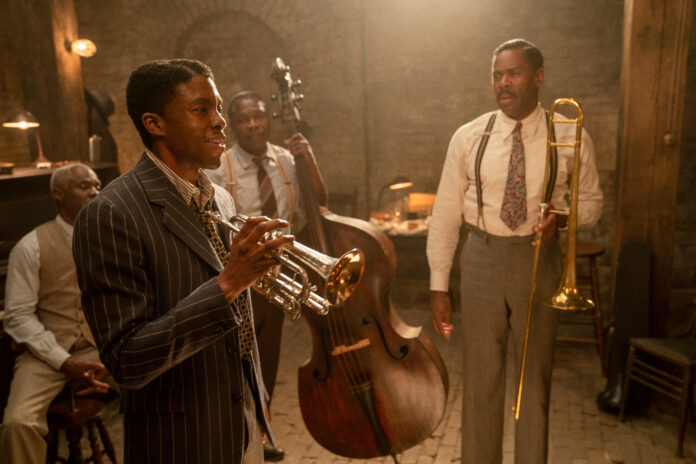
Out gay Philadelphia native and Temple University graduate Colman Domingo is like a good session musician — he delivers great work while letting the stars shine. In “Ma Rainey’s Black Bottom,” out December 18 on Netflix, Domingo plays Cutler, a musician, accompanying Ma Rainey (Viola Davis), aka the Mother of the Blues, as she records an album for white producers. Cutler also manages the band, which includes hotheaded and would-be virtuoso Levee (Chadwick Boseman).
Out gay director George C. Wolfe stages the action — the source material is a 1982 play by August Wilson — to showcase the ensemble cast well. Davis is formidable, and Boseman’s turn will likely earn him a posthumous Oscar.
But keep an eye on Domingo, who provides reliable support, as he has done for more than two decades in projects as varied as “Fear the Walking Dead,” and “The Big Gay Sketch Show,” on TV, and in films including “Lee Daniels’ The Butler,” and the Philadelphia-set and shot gay drama “Beautiful Something.”
The actor spoke with PGN about making “Ma Rainey’s Black Bottom.”
When did you first see the play, and what thoughts did you have about bringing this play to the screen?
The first time I saw a production was on Broadway with Whoopi Goldberg and Charles S. Dutton. I thought it was fantastic. I thought I knew about Ma Rainey, but I had to inquire a bit more. Then, to find out she was gay, blew my mind. August Wilson is our Black Shakespeare. I felt like the show was speaking to me as a Black man and an artist. When I got the offer to do this, I thought, it’s so theatrical. But it’s also musical. So, this is going to be a tricky dance to adapt to film. But I know it was in good hands with [screenwriter] Ruben Santiago-Hudson, who knows August Wilson like no one else. And George [Wolfe] is a great curator of art. He is open to ideas and creating something that has not been done before. He casted disruptors to create a kinetic energy and make something very moving and meaningful — especially this year, when our country is racked with pain and injustice. This film is a grace note as we wrestle with these themes and have deeper, harder conversations.
The film shows how the Black characters are exploited and how their work is appropriated. Can you talk about that theme?
That’s an examination of Rock and Roll. Does anyone pay respect and homage to where something comes from? When I listen to a song with a great hook, and then I hear something from the 1950s, I think, “They swiped that!” “Ma Rainey” is about African Americans wrestling with this. It’s about legacy, but it’s about agency in careers — their voices matter. Cutler tries to get through the day and navigate racist, oppressive systems [the producers], as well as manage his bandmates, while also being the proxy for Ma as well. There’s codeswitching and it’s a balancing act. He finds security in religion which gets challenged and upended.
Yes, Cutler tries to keep the peace, but often fights with the aggressive Levee. Boseman gives a very showboating performance, but you give a really internal performance. How did you balance the tension with Chadwick?
We had a low simmer on a hot day. In the studio, things are going to boil over. Lateness could be fine for Levee on a day where Cutler is not navigating with white producers. Cutler adheres to the rules, so Levee sets him off. They have different philosophies and ethos. Cutler once may have had some Levee in him — wanting to step out on his own — but he acquiesced to do this job and attach himself to Ma’s band. Ma gave him that position; he has a voice, so why sacrifice that? The challenging part is that Levee brings on strife and trouble. Levee is challenging God when horrible things happen. Cutler says one has to believe in God or they can’t exist in the world. They can’t help but come to blows.
Did you play the trombone like Cutler does?
We all learned to look as proficient as possible. I know slide positions and how to hold my mouth on the horn. Branford Marsalis’s band backed us up. We wanted to respect his musicianship.
What kind of music do you like?
Jazz. I’m listening to a lot of Charlie Mingus and I’m in a Sarah Vaughn period. She keeps me peaceful.
As an openly gay actor, what observations do you have about your career, and what are your goals/ambitions now that you have been working for 25 years?
I just want to keep creating interesting roles. I’m a character actor. I’m drawn to complex, off-kilter parts. I’m less afraid of taking the lead; I like to follow a character through their arc.
Smaller nuanced work is not appreciated. Most folks want the flash. I like to make it look effortless. But if you see the work I’ve done, you can see the choices I made. I want to be brothers with Gary Oldman and Daniel Day-Lewis and slip into a role. When I was nominated for a Tony it was for a musical. I’m not a musical theatre guy. I’m a character actor who ended up in a musical. I can hold a tune and dance, but after that role, I did an Athol Fugard play. The world tries to pigeonhole me. I like to be a shapeshifter.